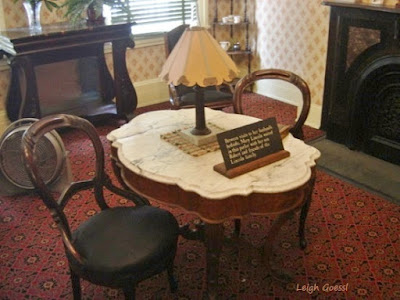The home President Lincoln was carried into was owned by a family named Petersen. Located at 516 10th Street, today that home is known as the “Petersen House” and is a historic property.
 |
| Sign on the fence in front of Petersen House |
The townhouse is maintained and operated by the National Park Service (NPS) and visitors are able to visit the home as a part of their Ford’s Theatre Tour.
Interesting facts about Petersen House
1. The townhouse at 516 10th Street was built by William and Anna Petersen in 1849. Both William and Anna came to the United States from Germany. Mr. Petersen was a tailor and the couple had 10 children (five survived to adulthood).
2. The house is made of red brick. It has three stories, along with a basement. During the Civil War there was a high demand for rooms in Washington D.C. with many people traveling into the city. The Petersens routinely rented rooms in their home to boarders.
3. When President Lincoln was carried across the street, he was placed in a bedroom rented by William T. Clark. Clark was a Union solider who was not home at the time. The original bed where Lincoln was rested is not currently in Petersen House, but this plaque shows a photo of the original, along with some other information (click on the photo to enlarge to see detail).
4. More than 90 people came through the Petersens’ doors that fateful evening to pay last respects to President Lincoln as doctors were tending to him. During this time the Petersens and some of their boarders stayed in the basement. Government officials conducted inquiries during this time.
5. Mary Lincoln passed those terrible hours waiting in the Petersens’ parlor, overcome with grief. Son Robert was at her side.
6. After the president’s death, the home became a popular tourist destination.
7. Mr. and Mrs. Petersen lived in their home until they both passed away in 1871.
8. In 1878 a man named Louis Schade purchased the Petersen House. He paid $4,500 and used the townhouse as both living and work space. Schade was the owner of The Washington Sentinel and ran the paper from his new home.
9. After many years, Schade tired of the stream of visitors to the house and decided to move. The Petersen home was purchased by the U.S. government in 1896 for $30,000.
 |
| Visitors wait for their tour of Petersen House |
10. The house was leased to the Memorial Association of D.C. in 1896. Osborn Oldroyd, a Lincoln enthusiast since the 1860 election, was a Civil War veteran. He lived in the home, bringing his extensive Lincoln collection to the Petersen House to put on display. Eventually, this collection would be purchased by the U.S. Government and become a part of the Ford’s Theatre collection.
[ Related reading: 11 interesting facts about Ford's Theatre ]
11. Today the Petersen House is furnished as it would have been in 1865. None of the furniture inside of the home is original. After the Petersens died, their furniture was sold at auction.
12. The bed Lincoln was lying on when he died was bought for $80 by William H. Boyd. Boyd’s son sold the bed to a wealthy man in Chicago named Charles F. Gunther. Today the bed is currently owned by the Chicago Historical Society.
The Petersen House is open to visitors from 9:30 a.m. to 5:30 p.m. To see the Petersen House, it is part of the Ford’s Theatre Tour. I have a detailed post on the history of Ford’s Theatre and how to get tickets in this post if you're looking for more information and/or how to visit.
Additional source: http://npshistory.com/brochures/foth/1967.pdf



this is just the info i need ed for my project thks for making this stuff i also saw your other site about the fords theatre and you are really good!!!
ReplyDeleteI'm so glad to hear my posts are helpful, thanks for sharing and also for the feedback and kind words!
DeleteThank you for doing this this helped my project a lot.
ReplyDeleteThank you for posting. I'm so happy to hear this post helped you with your project. Good luck! :)
Delete